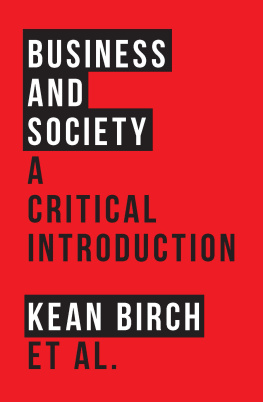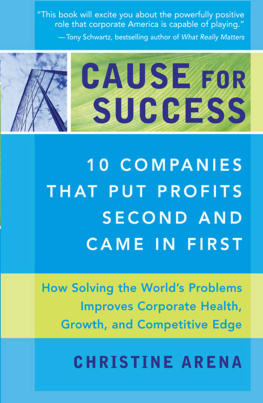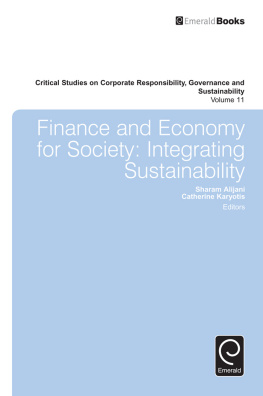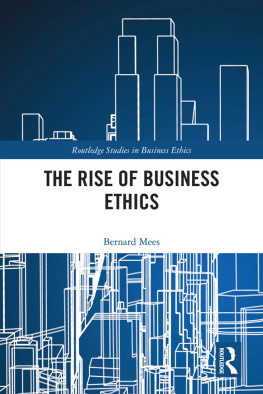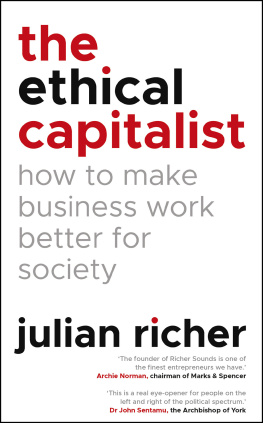More praise for Business and Society: A Critical Introduction
Goes beyond conventional accounts to critically expose the complex realities of the relationship between business and society. With clarity and originality, the authors illuminate the role of business for shaping society both in the past and present.
Sara Gorgoni, University of Greenwich
Offers a wide-ranging introductory interdisciplinary text for the study of the modern world. Rich in conceptual debate, it provides students with incisive analysis and criticism. This is the antidote to the anodyne business school textbook.
Liam Campling, Queen Mary University of London
Business and society
A critical introduction
Kean Birch
and Mark Peacock, Richard Wellen, Caroline Shenaz Hossein, Sonya Scott and Alberto Salazar
Business and Society: A critical introduction was first published in 2017 by Zed Books Ltd, The Foundry, 17 Oval Way, London SE11 5RR, UK.
www.zedbooks.net
Copyright Kean Birch, Mark Peacock, Richard Wellen, Caroline Shenaz Hossein, Sonya Scott, and Alberto Salazar 2017.
The rights of Kean Birch, Mark Peacock, Richard Wellen, Caroline Shenaz Hossein, Sonya Scott and Alberto Salazar to be identified as the authors of this work have been asserted by them in accordance with the Copyright, Designs and Patents Act, 1988.
Typeset in Arnhem and Kievit by Swales & Willis Ltd, Exeter, Devon
Index by Ed Emery
Cover design by Kika-Sroka Miller
All rights reserved. No part of this publication may be reproduced, stored in a retrieval system or transmitted in any form or by any means, electronic, mechanical, photocopying or otherwise, without the prior permission of Zed Books Ltd.
A catalogue record for this book is available from the British Library.
ISBN 978-1-78360-449-4 hb
ISBN 978-1-78360-448-7 pb
ISBN 978-1-78360-450-0 pdf
ISBN 978-1-78360-451-7 epub
ISBN 978-1-78360-452-4 mobi
Contents
Tables
Comparison of feudalism and capitalism |
Joint-stock company vs. partnership |
Institutional ownership of largest US corporations, 2009 |
International comparison of average executive pay |
Ratio of CEO pay to average worker |
Changing attitudes to business through US history |
Top ten countries by GDP |
Two ages of globalization |
Global governance agreements and organizations |
Timeline of major global environmental events and agreements |
Two views of sustainability |
Classifying resources |
Principles of old institutional economics |
Resistance to corporate capitalism |
Organizational form and principles in the social economy |
Social economy organizations |
Commons-based access, ownership and production |
Figures
Coreperiphery relations |
Map of transatlantic slave trade |
Internal corporate control |
Rising global temperatures |
We would like to thank a number of people. First, we would like to thank our colleagues and students, past and present, for their contributions and suggestions. We are especially thankful to our students over the years, who are the ones who inspired us to write this book in the first place. Second, we would like to thank Ken Barlow at Zed Books for his efforts over the last couple of years in keeping us on the straight and narrow. Third, we would like to thank the anonymous reviewers and reader for their suggestions and comments to improve the book; they have all contributed to its development. Finally, we thank our families for their forbearance and support during the writing of the book without them, none of this would have been possible or worthwhile.
Getting to the point of publication has been a complicated process for us, especially coordinating the work and input of six contributing authors to the book. Kean Birch coordinated the overall project and authored or co-authored a majority of the chapters, to which he has not added his name. The rest of the chapters were authored or co-authored by everyone else, and they have added their names to the relevant chapters. (In addition, J.J. McMurtry co-authored chapter 17 with Kean Birch.) Each chapter, however, has benefited from suggestions and written contributions by all of us on things like content, layout, case studies, definitions and so on. As such, this book has been a collaborative project to which we all contributed in a number of ways.
Kean Birch is an associate professor in the Business and Society programme at York University, Canada. His recent books include: We Have Never Been Neoliberal (2015); The Handbook of Neoliberalism (2016, co-edited with Simon Springer and Julie MacLeavy); and Innovation, Regional Development and the Life Sciences: Beyond Clusters (2016).
Caroline Shenaz Hossein is an assistant professor in the Business and Society programme in the Department of Social Science at York University, Canada. She is the author of Politicized Microfinance: Money, Power and Violence in the Black Americas (2016).
Mark Peacock is professor in the Business and Society programme at York University, Canada. His research interests include the philosophy of economics and the theory and origins of money. He recently published the book Introducing Money (2013).
Alberto Salazar is an assistant professor in the Department of Law and Legal Studies at Carleton University, Canada. His most recent publications appear in the American Journal of Comparative Law and Osgoode Legal Studies Research Papers .
Sonya Scott is a sessional assistant professor in the Business and Society programme at York University, Canada. She is the author of Architectures of Economic Subjectivity: The Philosophical Foundations of the Subject in the History of Economic Thought (2013).
Richard Wellen is an associate professor in the Business and Society programme at York University, Canada. His recent research deals with the political economy of higher education as well as transformations and alternatives in scholarly publishing markets. His books include Making Policy in Turbulent Times: Challenges and Prospects for Higher Education (2013, co-edited with Paul Axelrod, Theresa Shanahan and Roopa Deesai-Trilokekar).
Introduction
This book is about the relationship between ). Specifically, capitalist societies have moved from treating the environment as a free gift to incorporating pollution as an economic cost; this has happened alongside growing social awareness and action to address the implications of harmful environmental changes we discuss this in more detail in Chapter 9. In this context, business and society cannot be isolated from one another in their treatment of environmental problems, since they are so entangled with one another that it makes no sense to posit a simple one-way causative relation (i.e. societal values forcing changes in business practice, or vice versa).
Definition: Business
The term business is a generic term we use to mean any organization that engages in for-profit activities, no matter how those profits are subsequently distributed. That means that business covers a range of organizations, including: public corporations (see below), private firms, partnerships, family firms, sole proprietorships, state-owned enterprises, worker co-operatives and consumer co-operatives.

